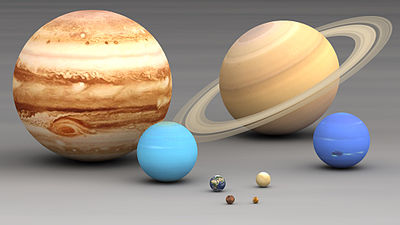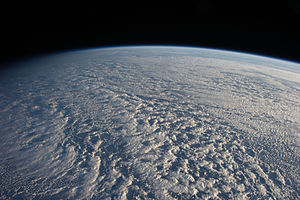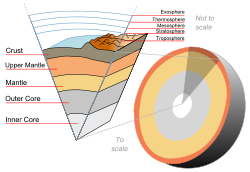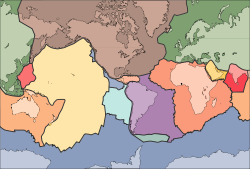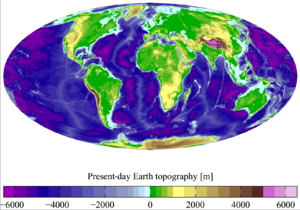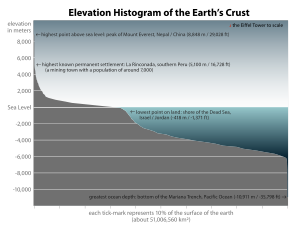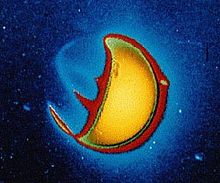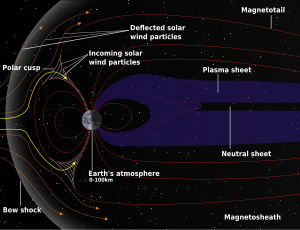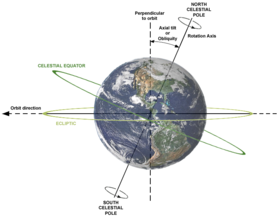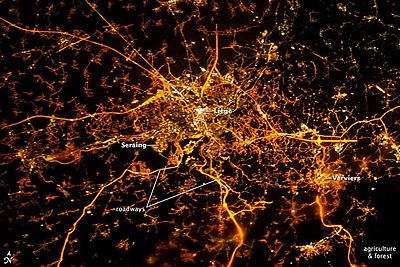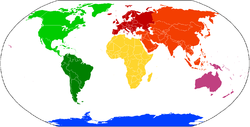
Earth
About this schools Wikipedia selection
SOS Children made this Wikipedia selection alongside other schools resources. Before you decide about sponsoring a child, why not learn about different sponsorship charities first?
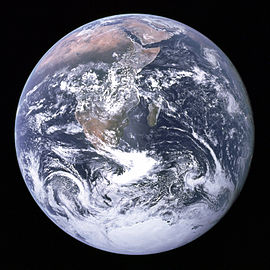 " The Blue Marble" photograph of Earth, taken from Apollo 17 |
|||||||||||||
| Designations | |||||||||||||
|---|---|---|---|---|---|---|---|---|---|---|---|---|---|
| Alternative names | Terra, Gaia | ||||||||||||
| Orbital characteristics | |||||||||||||
| Epoch J2000.0 | |||||||||||||
| Aphelion | 152,098,232 km 1.01671388 AU |
||||||||||||
| Perihelion | 147,098,290 km 0.98329134 AU |
||||||||||||
| Semi-major axis | 149,598,261 km 1.00000261 AU |
||||||||||||
| Eccentricity | 0.01671123 | ||||||||||||
| Orbital period | 365.256363004 days 1.000017421 yr |
||||||||||||
| Average orbital speed | 29.78 km/s 107,200 km/h |
||||||||||||
| Mean anomaly | 357.51716° | ||||||||||||
| Inclination | 7.155° to Sun's equator 1.57869° to invariable plane |
||||||||||||
| Longitude of ascending node | 348.73936° | ||||||||||||
| Argument of perihelion | 114.20783° | ||||||||||||
| Satellites | 1 natural (the Moon), 8,300+ artificial (as of 1 March 2001) |
||||||||||||
| Physical characteristics | |||||||||||||
| Mean radius | 6,371.0 km | ||||||||||||
| Equatorial radius | 6,378.1 km | ||||||||||||
| Polar radius | 6,356.8 km | ||||||||||||
| Flattening | 0.0033528 | ||||||||||||
| Circumference | 40,075.017 km (equatorial) 40,007.86 km ( meridional) |
||||||||||||
| Surface area |
510,072,000 km2 148,940,000 km2 land (29.2 %) |
||||||||||||
| Volume | 1.08321×1012 km3 | ||||||||||||
| Mass |
5.9736×1024 kg |
||||||||||||
| Mean density | 5.515 g/cm3 | ||||||||||||
| Equatorial surface gravity | 9.780327 m/s2 0.99732 g |
||||||||||||
| Escape velocity | 11.186 km/s | ||||||||||||
| Sidereal rotation period | 0.99726968 d 23h 56m 4.100s |
||||||||||||
| Equatorial rotation velocity | 1,674.4 km/h (465.1 m/s) | ||||||||||||
| Axial tilt | 23°26'21".4119 | ||||||||||||
| Albedo |
0.367 ( geometric) |
||||||||||||
|
|||||||||||||
| Atmosphere | |||||||||||||
| Surface pressure | 101.325 kPa ( MSL) | ||||||||||||
| Composition | 78.08% nitrogen (N2) (dry air) 20.95% oxygen (O2) 0.93% argon 0.039% carbon dioxide About 1% water vapor (varies with climate) |
||||||||||||
Earth is the third planet from the Sun, and the densest and fifth-largest of the eight planets in the Solar System. It is also the largest of the Solar System's four terrestrial planets. It is sometimes referred to as the world or the Blue Planet.
Earth formed approximately 4.54 billion years ago, and life appeared on its surface within one billion years. Earth's biosphere then significantly altered the atmospheric and other basic physical conditions, which enabled the proliferation of organisms as well as the formation of the ozone layer, which together with Earth's magnetic field blocked harmful solar radiation, and permitted formerly ocean-confined life to move safely to land. The physical properties of the Earth, as well as its geological history and orbit, have allowed life to persist. Estimates on how much longer the planet will be able to continue to support life range from 500 million years (myr), to as long as 2.3 billion years (byr).
Earth's lithosphere is divided into several rigid segments, or tectonic plates, that migrate across the surface over periods of many millions of years. About 71% of the surface is covered by salt water oceans, with the remainder consisting of continents and islands which together have many lakes and other sources of water that contribute to the hydrosphere. Earth's poles are mostly covered with ice that is the solid ice of the Antarctic ice sheet and the sea ice that is the polar ice packs. The planet's interior remains active, with a solid iron inner core, a liquid outer core that generates the magnetic field, and a thick layer of relatively solid mantle.
Earth gravitationally interacts with other objects in space, especially the Sun and the Moon. During one orbit around the Sun, the Earth rotates about its own axis 366.26 times, creating 365.26 solar days, or one sidereal year. The Earth's axis of rotation is tilted 23.4° away from the perpendicular of its orbital plane, producing seasonal variations on the planet's surface with a period of one tropical year (365.24 solar days). The Moon is Earth's only natural satellite. It began orbiting the Earth about 4.53 billion years ago (bya). The Moon's gravitational interaction with Earth stimulates ocean tides, stabilizes the axial tilt, and gradually slows the planet's rotation.
The planet is home to millions of species, including humans. Both the mineral resources of the planet and the products of the biosphere contribute resources that are used to support a global human population. These inhabitants are grouped into about 200 independent sovereign states, which interact through diplomacy, travel, trade, and military action. Human cultures have developed many views of the planet, including its personification as a planetary deity, its shape as flat, its position as the centre of the universe, and in the modern Gaia Principle, as a single, self-regulating organism in its own right.
Name and etymology
The modern English noun earth developed from Middle English erthe (recorded in 1137), itself from Old English eorthe (dating from before 725), deriving from Proto-Germanic *erthō. Earth has cognates in all other Germanic languages, including Dutch aarde, German Erde, and Swedish, Norwegian, and Danish jord. The Earth is personified as a goddess in Germanic paganism (appearing as Jörð in Norse mythology, mother of the god Thor).
In general English usage, the name earth can be capitalized or spelled in lowercase interchangeably, either when used absolutely or prefixed with "the" (i.e. "Earth", "the Earth", "earth", or "the earth"). Many deliberately spell the name of the planet with a capital, both as "Earth" or "the Earth". This is to distinguish it as a proper noun, distinct from the senses of the term as a mass noun or verb (e.g. referring to soil, the ground, earthing in the electrical sense, etc.). Oxford spelling recognizes the lowercase form as the most common, with the capitalized form as a variant of it. Another common convention is to spell the name with a capital when occurring absolutely (e.g. Earth's atmosphere) and lowercase when preceded by "the" (e.g. the atmosphere of the earth). The term almost exclusively exists in lowercase when appearing in common phrases, even without "the" preceding it (e.g. "It does not cost the earth.", "What on earth are you doing?").
Chronology
Formation
The earliest material found in the Solar System is dated to 4.5672±0.0006 bya; therefore, it is inferred that the Earth must have been formed by accretion around this time. By 4.54±0.04 bya the primordial Earth had formed. The formation and evolution of the Solar System bodies occurred in tandem with the Sun. In theory a solar nebula partitions a volume out of a molecular cloud by gravitational collapse, which begins to spin and flatten into a circumstellar disk, and then the planets grow out of that in tandem with the star. A nebula contains gas, ice grains and dust (including primordial nuclides). In nebular theory planetesimals commence forming as particulate accrues by cohesive clumping and then by gravity. The assembly of the primordial Earth proceeded for 10–20 myr. The Moon formed shortly thereafter, about 4.53 bya.
The Moon's formation remains debated. The working hypothesis is that it formed by accretion from material loosed from the Earth after a Mars-sized object dubbed Theia impacted with Earth. The model, however, is not self-consistent. In this scenario the mass of Theia is 10% of the Earth's mass, it impacts with the Earth in a glancing blow, and some of its mass merges with the Earth. Between approximately 3.8 and 4.1 bya, numerous asteroid impacts during the Late Heavy Bombardment caused significant changes to the greater surface environment of the Moon, and by inference, to the Earth.
Earth's atmosphere and oceans formed by volcanic activity and outgassing that included water vapor. The origin of the world's oceans was condensation augmented by water and ice delivered by asteroids, proto-planets, and comets. In this model, atmospheric "greenhouse gases" kept the oceans from freezing while the newly forming Sun was only at 70% luminosity. By 3.5 bya, the Earth's magnetic field was established, which helped prevent the atmosphere from being stripped away by the solar wind.
A crust formed when the molten outer layer of the planet Earth cooled to form a solid as the accumulated water vapor began to act in the atmosphere. The two models that explain land mass propose either a steady growth to the present-day forms or, more likely, a rapid growth early in Earth history followed by a long-term steady continental area. Continents formed by plate tectonics, a process ultimately driven by the continuous loss of heat from the earth's interior. On time scales lasting hundreds of millions of years, the supercontinents have formed and broken up three times. Roughly 750 mya (million years ago), one of the earliest known supercontinents, Rodinia, began to break apart. The continents later recombined to form Pannotia, 600–540 mya, then finally Pangaea, which also broke apart 180 mya.
Evolution of life
Highly energetic chemistry is thought to have produced a self-replicating molecule around 4 bya and half a billion years later the last common ancestor of all life existed. The development of photosynthesis allowed the Sun's energy to be harvested directly by life forms; the resultant oxygen accumulated in the atmosphere and formed a layer of ozone (a form of molecular oxygen [O3]) in the upper atmosphere. The incorporation of smaller cells within larger ones resulted in the development of complex cells called eukaryotes. True multicellular organisms formed as cells within colonies became increasingly specialized. Aided by the absorption of harmful ultraviolet radiation by the ozone layer, life colonized the surface of Earth.
Since the 1960s, it has been hypothesized that severe glacial action between 750 and 580 mya, during the Neoproterozoic, covered much of the planet in a sheet of ice. This hypothesis has been termed "Snowball Earth", and is of particular interest because it preceded the Cambrian explosion, when multicellular life forms began to proliferate.
Following the Cambrian explosion, about 535 mya, there have been five major mass extinctions. The most recent such event was 66 mya, when an asteroid impact triggered the extinction of the (non-avian) dinosaurs and other large reptiles, but spared some small animals such as mammals, which then resembled shrews. Over the past 66 myr, mammalian life has diversified, and several million years ago an African ape-like animal such as Orrorin tugenensis gained the ability to stand upright. This enabled tool use and encouraged communication that provided the nutrition and stimulation needed for a larger brain, which allowed the evolution of the human race. The development of agriculture, and then civilization, allowed humans to influence the Earth in a short time span as no other life form had, affecting both the nature and quantity of other life forms.
The present pattern of ice ages began about 40 mya and then intensified during the Pleistocene about 3 mya. High-latitude regions have since undergone repeated cycles of glaciation and thaw, repeating every 40–100,000 years. The last continental glaciation ended 10,000 years ago.
Future
The future of the planet is closely tied to that of the Sun. As a result of the steady accumulation of helium at the Sun's core, the star's total luminosity will slowly increase. The luminosity of the Sun will grow by 10% over the next 1.1 byr and by 40% over the next 3.5 byr. Climate models indicate that the rise in radiation reaching the Earth is likely to have dire consequences, including the loss of the planet's oceans.
The Earth's increasing surface temperature will accelerate the inorganic CO2 cycle, reducing its concentration to levels lethally low for plants (10 ppm for C4 photosynthesis) in approximately 500-900 myr. The lack of vegetation will result in the loss of oxygen in the atmosphere, so animal life will become extinct within several million more years. After another billion years all surface water will have disappeared and the mean global temperature will reach 70 °C (158 °F). The Earth is expected to be effectively habitable for about another 500 myr from that point, although this may be extended up to 2.3 byr if the nitrogen is removed from the atmosphere. Even if the Sun were eternal and stable, 27% of the water in the modern oceans will descend to the mantle in one billion years due to reduced steam venting from mid-ocean ridges.
The Sun, as part of its evolution, will become a red giant in about 5 byr. Models predict that the Sun will expand out to about 250 times its present radius, roughly 1 AU (150,000,000 km). Earth's fate is less clear. As a red giant, the Sun will lose roughly 30% of its mass, so, without tidal effects, the Earth will move to an orbit 1.7 AU (250,000,000 km) from the Sun, when the star reaches its maximum radius. The planet was therefore initially expected to escape envelopment by the expanded Sun's sparse outer atmosphere, though most, if not all, remaining life would have been destroyed by the Sun's increased luminosity (peaking at about 5000 times its present level). A 2008 simulation indicates that Earth's orbit will decay due to tidal effects and drag, causing it to enter the red giant Sun's atmosphere and be vaporized. After that, the Sun's core will collapse into a white dwarf, as its outer layers are ejected into space as a planetary nebula. The matter that once made up the Earth will be released into interstellar space, where it may one day become incorporated into a new generation of planets and other celestial bodies.
Composition and structure
Earth is a terrestrial planet, meaning that it is a rocky body, rather than a gas giant like Jupiter. It is the largest of the four solar terrestrial planets in size and mass. Of these four planets, Earth also has the highest density, the highest surface gravity, the strongest magnetic field, and fastest rotation, and is probably the only one with active plate tectonics.
Shape
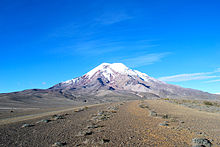
The shape of the Earth approximates an oblate spheroid, a sphere flattened along the axis from pole to pole such that there is a bulge around the equator. This bulge results from the rotation of the Earth, and causes the diameter at the equator to be 43 km (kilometer) larger than the pole-to-pole diameter. For this reason the furthest point on the surface from the Earth's centre of mass is the Chimborazo volcano in Ecuador. The average diameter of the reference spheroid is about 12,742 km, which is approximately 40,000 km/π, as the meter was originally defined as 1/10,000,000 of the distance from the equator to the North Pole through Paris, France.
Local topography deviates from this idealized spheroid, although on a global scale, these deviations are small: Earth has a tolerance of about one part in about 584, or 0.17%, from the reference spheroid, which is less than the 0.22% tolerance allowed in billiard balls. The largest local deviations in the rocky surface of the Earth are Mount Everest (8848 m above local sea level) and the Mariana Trench (10,911 m below local sea level). Due to the equatorial bulge, the surface locations farthest from the centre of the Earth are the summits of Mount Chimborazo in Ecuador and Huascarán in Peru.
| Compound | Formula | Composition | |
|---|---|---|---|
| Continental | Oceanic | ||
| silica | SiO2 | 60.2% | 48.6% |
| alumina | Al2O3 | 15.2% | 16.5% |
| lime | CaO | 5.5% | 12.3% |
| magnesia | MgO | 3.1% | 6.8% |
| iron(II) oxide | FeO | 3.8% | 6.2% |
| sodium oxide | Na2O | 3.0% | 2.6% |
| potassium oxide | K2O | 2.8% | 0.4% |
| iron(III) oxide | Fe2O3 | 2.5% | 2.3% |
| water | H2O | 1.4% | 1.1% |
| carbon dioxide | CO2 | 1.2% | 1.4% |
| titanium dioxide | TiO2 | 0.7% | 1.4% |
| phosphorus pentoxide | P2O5 | 0.2% | 0.3% |
| Total | 99.6% | 99.9% | |
Chemical composition
The mass of the Earth is approximately 5.98×1024 kg. It is composed mostly of iron (32.1%), oxygen (30.1%), silicon (15.1%), magnesium (13.9%), sulfur (2.9%), nickel (1.8%), calcium (1.5%), and aluminium (1.4%); with the remaining 1.2% consisting of trace amounts of other elements. Due to mass segregation, the core region is believed to be primarily composed of iron (88.8%), with smaller amounts of nickel (5.8%), sulfur (4.5%), and less than 1% trace elements.
The geochemist F. W. Clarke calculated that a little more than 47% of the Earth's crust consists of oxygen. The more common rock constituents of the Earth's crust are nearly all oxides; chlorine, sulfur and fluorine are the only important exceptions to this and their total amount in any rock is usually much less than 1%. The principal oxides are silica, alumina, iron oxides, lime, magnesia, potash and soda. The silica functions principally as an acid, forming silicates, and all the commonest minerals of igneous rocks are of this nature. From a computation based on 1,672 analyses of all kinds of rocks, Clarke deduced that 99.22% were composed of 11 oxides (see the table at right), with the other constituents occurring in minute quantities.
Internal structure
The interior of the Earth, like that of the other terrestrial planets, is divided into layers by their chemical or physical ( rheological) properties, but unlike the other terrestrial planets, it has a distinct outer and inner core. The outer layer of the Earth is a chemically distinct silicate solid crust, which is underlain by a highly viscous solid mantle. The crust is separated from the mantle by the Mohorovičić discontinuity, and the thickness of the crust varies: averaging 6 km (kilometers) under the oceans and 30-50 km on the continents. The crust and the cold, rigid, top of the upper mantle are collectively known as the lithosphere, and it is of the lithosphere that the tectonic plates are comprised. Beneath the lithosphere is the asthenosphere, a relatively low-viscosity layer on which the lithosphere rides. Important changes in crystal structure within the mantle occur at 410 and 660 km below the surface, spanning a transition zone that separates the upper and lower mantle. Beneath the mantle, an extremely low viscosity liquid outer core lies above a solid inner core. The inner core may rotate at a slightly higher angular velocity than the remainder of the planet, advancing by 0.1–0.5° per year.
|
Earth cutaway from core to exosphere. Not to scale. |
Depth km |
Component Layer | Density g/cm3 |
|---|---|---|---|
| 0–60 | Lithosphere | — | |
| 0–35 | Crust | 2.2–2.9 | |
| 35–60 | Upper mantle | 3.4–4.4 | |
| 35–2890 | Mantle | 3.4–5.6 | |
| 100–700 | Asthenosphere | — | |
| 2890–5100 | Outer core | 9.9–12.2 | |
| 5100–6378 | Inner core | 12.8–13.1 |
Heat
Earth's internal heat comes from a combination of residual heat from planetary accretion (about 20%) and heat produced through radioactive decay (80%). The major heat-producing isotopes in the Earth are potassium-40, uranium-238, uranium-235, and thorium-232. At the centre of the planet, the temperature may be up to 7,000 K and the pressure could reach 360 GPa. Because much of the heat is provided by radioactive decay, scientists believe that early in Earth history, before isotopes with short half-lives had been depleted, Earth's heat production would have been much higher. This extra heat production, twice present-day at approximately 3 byr, would have increased temperature gradients within the Earth, increasing the rates of mantle convection and plate tectonics, and allowing the production of igneous rocks such as komatiites that are not formed today.
| Isotope | Heat release Wkg isotope |
Half-life years |
Mean mantle concentration kg isotopekg mantle |
Heat release Wkg mantle |
|---|---|---|---|---|
| 238U | 9.46 × 10−5 | 4.47 × 109 | 30.8 × 10−9 | 2.91 × 10−12 |
| 235U | 5.69 × 10−4 | 7.04 × 108 | 0.22 × 10−9 | 1.25 × 10−13 |
| 232Th | 2.64 × 10−5 | 1.40 × 1010 | 124 × 10−9 | 3.27 × 10−12 |
| 40K | 2.92 × 10−5 | 1.25 × 109 | 36.9 × 10−9 | 1.08 × 10−12 |
The mean heat loss from the Earth is 87 mW m−2, for a global heat loss of 4.42 × 1013 W. A portion of the core's thermal energy is transported toward the crust by mantle plumes; a form of convection consisting of upwellings of higher-temperature rock. These plumes can produce hotspots and flood basalts. More of the heat in the Earth is lost through plate tectonics, by mantle upwelling associated with mid-ocean ridges. The final major mode of heat loss is through conduction through the lithosphere, the majority of which occurs in the oceans because the crust there is much thinner than that of the continents.
Tectonic plates
The mechanically rigid outer layer of the Earth, the lithosphere, is broken into pieces called tectonic plates. These plates are rigid segments that move in relation to one another at one of three types of plate boundaries: Convergent boundaries, at which two plates come together, Divergent boundaries, at which two plates are pulled apart, and Transform boundaries, in which two plates slide past one another laterally. Earthquakes, volcanic activity, mountain-building, and oceanic trench formation can occur along these plate boundaries. The tectonic plates ride on top of the asthenosphere, the solid but less-viscous part of the upper mantle that can flow and move along with the plates, and their motion is strongly coupled with convection patterns inside the Earth's mantle.
As the tectonic plates migrate across the planet, the ocean floor is subducted under the leading edges of the plates at convergent boundaries. At the same time, the upwelling of mantle material at divergent boundaries creates mid-ocean ridges. The combination of these processes continually recycles the oceanic crust back into the mantle. Due to this recycling, most of the ocean floor is less than 100 myr old in age. The oldest oceanic crust is located in the Western Pacific, and has an estimated age of about 200 myr. By comparison, the oldest dated continental crust is 4,030 myr.
The seven major plates are the Pacific, North American, Eurasian, African, Antarctic, Indo-Australian, and South American. Other notable plates include the Arabian Plate, the Caribbean Plate, the Nazca Plate off the west coast of South America and the Scotia Plate in the southern Atlantic Ocean. The Australian Plate fused with the Indian Plate between 50 and 55 mya. The fastest-moving plates are the oceanic plates, with the Cocos Plate advancing at a rate of 75 mm/year and the Pacific Plate moving 52–69 mm/year. At the other extreme, the slowest-moving plate is the Eurasian Plate, progressing at a typical rate of about 21 mm/year.
Surface
The Earth's terrain varies greatly from place to place. About 70.8% of the surface is covered by water, with much of the continental shelf below sea level. This equates to 361.132 million km2 (139.43 million sq mi). The submerged surface has mountainous features, including a globe-spanning mid-ocean ridge system, as well as undersea volcanoes, oceanic trenches, submarine canyons, oceanic plateaus and abyssal plains. The remaining 29.2% (148.94 million km2, or 57.51 million sq mi) not covered by water consists of mountains, deserts, plains, plateaus, and other geomorphologies.
The planetary surface undergoes reshaping over geological time periods due to tectonics and erosion. The surface features built up or deformed through plate tectonics are subject to steady weathering from precipitation, thermal cycles, and chemical effects. Glaciation, coastal erosion, the build-up of coral reefs, and large meteorite impacts also act to reshape the landscape.
The continental crust consists of lower density material such as the igneous rocks granite and andesite. Less common is basalt, a denser volcanic rock that is the primary constituent of the ocean floors. Sedimentary rock is formed from the accumulation of sediment that becomes compacted together. Nearly 75% of the continental surfaces are covered by sedimentary rocks, although they form only about 5% of the crust. The third form of rock material found on Earth is metamorphic rock, which is created from the transformation of pre-existing rock types through high pressures, high temperatures, or both. The most abundant silicate minerals on the Earth's surface include quartz, the feldspars, amphibole, mica, pyroxene and olivine. Common carbonate minerals include calcite (found in limestone) and dolomite.
The pedosphere is the outermost layer of the Earth that is composed of soil and subject to soil formation processes. It exists at the interface of the lithosphere, atmosphere, hydrosphere and biosphere. Currently the total arable land is 13.31% of the land surface, with only 4.71% supporting permanent crops. Close to 40% of the Earth's land surface is presently used for cropland and pasture, or an estimated 1.3×107 km2 of cropland and 3.4×107 km2 of pastureland.
The elevation of the land surface of the Earth varies from the low point of −418 m at the Dead Sea, to a 2005-estimated maximum altitude of 8,848 m at the top of Mount Everest. The mean height of land above sea level is 840 m.
Besides being divided logically into Northern and Southern Hemispheres centered on the earths poles, the earth has been divided arbitrarily into Eastern and Western Hemispheres.
Hydrosphere
The abundance of water on Earth's surface is a unique feature that distinguishes the "Blue Planet" from others in the Solar System. The Earth's hydrosphere consists chiefly of the oceans, but technically includes all water surfaces in the world, including inland seas, lakes, rivers, and underground waters down to a depth of 2,000 m. The deepest underwater location is Challenger Deep of the Mariana Trench in the Pacific Ocean with a depth of −10,911.4 m.
The mass of the oceans is approximately 1.35×1018 metric tons, or about 1/4400 of the total mass of the Earth. The oceans cover an area of 3.618×108 km2 with a mean depth of 3,682 m, resulting in an estimated volume of 1.332×109 km3. If all the land on Earth were spread evenly, water would rise to an altitude of more than 2.7 km. About 97.5% of the water is saline, while the remaining 2.5% is fresh water. Most fresh water, about 68.7%, is currently ice.
The average salinity of the Earth's oceans is about 35 grams of salt per kilogram of sea water (35 ‰ salt). Most of this salt was released from volcanic activity or extracted from cool, igneous rocks. The oceans are also a reservoir of dissolved atmospheric gases, which are essential for the survival of many aquatic life forms. Sea water has an important influence on the world's climate, with the oceans acting as a large heat reservoir. Shifts in the oceanic temperature distribution can cause significant weather shifts, such as the El Niño-Southern Oscillation.
Atmosphere
The atmospheric pressure on the surface of the Earth averages 101.325 kPa, with a scale height of about 8.5 km. It is 78% nitrogen and 21% oxygen, with trace amounts of water vapor, carbon dioxide and other gaseous molecules. The height of the troposphere varies with latitude, ranging between 8 km at the poles to 17 km at the equator, with some variation resulting from weather and seasonal factors.
Earth's biosphere has significantly altered its atmosphere. Oxygenic photosynthesis evolved 2.7 bya, forming the primarily nitrogen-oxygen atmosphere of today. This change enabled the proliferation of aerobic organisms as well as the formation of the ozone layer which blocks ultraviolet solar radiation, permitting life on land. Other atmospheric functions important to life on Earth include transporting water vapor, providing useful gases, causing small meteors to burn up before they strike the surface, and moderating temperature. This last phenomenon is known as the greenhouse effect: trace molecules within the atmosphere serve to capture thermal energy emitted from the ground, thereby raising the average temperature. Water vapor, carbon dioxide, methane and ozone are the primary greenhouse gases in the Earth's atmosphere. Without this heat-retention effect, the average surface would be −18 °C, in contrast to the current +15 °C, and life would likely not exist.
Weather and climate
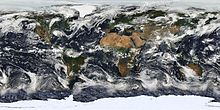
The Earth's atmosphere has no definite boundary, slowly becoming thinner and fading into outer space. Three-quarters of the atmosphere's mass is contained within the first 11 km of the planet's surface. This lowest layer is called the troposphere. Energy from the Sun heats this layer, and the surface below, causing expansion of the air. This lower density air then rises, and is replaced by cooler, higher density air. The result is atmospheric circulation that drives the weather and climate through redistribution of heat energy.
The primary atmospheric circulation bands consist of the trade winds in the equatorial region below 30° latitude and the westerlies in the mid-latitudes between 30° and 60°. Ocean currents are also important factors in determining climate, particularly the thermohaline circulation that distributes heat energy from the equatorial oceans to the polar regions.
Water vapor generated through surface evaporation is transported by circulatory patterns in the atmosphere. When atmospheric conditions permit an uplift of warm, humid air, this water condenses and settles to the surface as precipitation. Most of the water is then transported to lower elevations by river systems and usually returned to the oceans or deposited into lakes. This water cycle is a vital mechanism for supporting life on land, and is a primary factor in the erosion of surface features over geological periods. Precipitation patterns vary widely, ranging from several meters of water per year to less than a millimeter. Atmospheric circulation, topological features and temperature differences determine the average precipitation that falls in each region.
The amount of solar energy reaching the Earth's decreases with increasing latitude. At higher latitudes the sunlight reaches the surface at lower angles and it must pass through thicker columns of the atmosphere. As a result, the mean annual air temperature at sea level decreases by about 0.4 °C per degree of latitude away from the equator. The Earth can be sub-divided into specific latitudinal belts of approximately homogeneous climate. Ranging from the equator to the polar regions, these are the tropical (or equatorial), subtropical, temperate and polar climates. Climate can also be classified based on the temperature and precipitation, with the climate regions characterized by fairly uniform air masses. The commonly used Köppen climate classification system (as modified by Wladimir Köppen's student Rudolph Geiger) has five broad groups (humid tropics, arid, humid middle latitudes, continental and cold polar), which are further divided into more specific subtypes.
Upper atmosphere
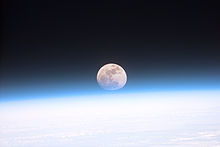
Above the troposphere, the atmosphere is usually divided into the stratosphere, mesosphere, and thermosphere. Each layer has a different lapse rate, defining the rate of change in temperature with height. Beyond these, the exosphere thins out into the magnetosphere, where the Earth's magnetic fields interact with the solar wind. Within the stratosphere is the ozone layer, a component that partially shields the surface from ultraviolet light and thus is important for life on Earth. The Kármán line, defined as 100 km above the Earth's surface, is a working definition for the boundary between atmosphere and space.
Thermal energy causes some of the molecules at the outer edge of the Earth's atmosphere to increase their velocity to the point where they can escape from the planet's gravity. This causes a slow but steady leakage of the atmosphere into space. Because unfixed hydrogen has a low molecular weight, it can achieve escape velocity more readily and it leaks into outer space at a greater rate than other gasses. The leakage of hydrogen into space contributes to the pushing of the Earth from an initially reducing state to its current oxidizing one. Photosynthesis provided a source of free oxygen, but the loss of reducing agents such as hydrogen is believed to have been a necessary precondition for the widespread accumulation of oxygen in the atmosphere. Hence the ability of hydrogen to escape from the Earth's atmosphere may have influenced the nature of life that developed on the planet. In the current, oxygen-rich atmosphere most hydrogen is converted into water before it has an opportunity to escape. Instead, most of the hydrogen loss comes from the destruction of methane in the upper atmosphere.
Magnetic field
The Earth's magnetic field is shaped roughly as a magnetic dipole, with the poles currently located proximate to the planet's geographic poles. At the equator of the magnetic field, the magnetic field strength at the planet's surface is 3.05 × 10−5 T, with global magnetic dipole moment of 7.91 × 1015 T m3. According to dynamo theory, the field is generated within the molten outer core region where heat creates convection motions of conducting materials, generating electric currents. These in turn produce the Earth's magnetic field. The convection movements in the core are chaotic; the magnetic poles drift and periodically change alignment. This causes field reversals at irregular intervals averaging a few times every million years. The most recent reversal occurred approximately 700,000 years ago.
The field forms the magnetosphere, which deflects particles in the solar wind. The sunward edge of the bow shock is located at about 13 times the radius of the Earth. The collision between the magnetic field and the solar wind forms the Van Allen radiation belts, a pair of concentric, torus-shaped regions of energetic charged particles. When the plasma enters the Earth's atmosphere at the magnetic poles, it forms the aurora.
Orbit and rotation
Rotation
Earth's rotation period relative to the Sun—its mean solar day—is 86,400 seconds of mean solar time (86,400.0025 SI seconds). As the Earth's solar day is now slightly longer than it was during the 19th century due to tidal acceleration, each day varies between 0 and 2 SI ms longer.
Earth's rotation period relative to the fixed stars, called its stellar day by the International Earth Rotation and Reference Systems Service (IERS), is 86164.098903691 seconds of mean solar time (UT1), or 23h 56m 4.098903691s. Earth's rotation period relative to the precessing or moving mean vernal equinox, misnamed its sidereal day, is 86164.09053083288 seconds of mean solar time (UT1) (23h 56m 4.09053083288s). Thus the sidereal day is shorter than the stellar day by about 8.4 ms. The length of the mean solar day in SI seconds is available from the IERS for the periods 1623–2005 and 1962–2005.
Apart from meteors within the atmosphere and low-orbiting satellites, the main apparent motion of celestial bodies in the Earth's sky is to the west at a rate of 15°/h = 15'/min. For bodies near the celestial equator, this is equivalent to an apparent diameter of the Sun or Moon every two minutes; from the planet's surface, the apparent sizes of the Sun and the Moon are approximately the same.
Orbit
Earth orbits the Sun at an average distance of about 150 million kilometers every 365.2564 mean solar days, or one sidereal year. From Earth, this gives an apparent movement of the Sun eastward with respect to the stars at a rate of about 1°/day, which is one apparent Sun or Moon diameter every 12 hours. Due to this motion, on average it takes 24 hours—a solar day—for Earth to complete a full rotation about its axis so that the Sun returns to the meridian. The orbital speed of the Earth averages about 29.8 km/s (107,000 km/h), which is fast enough to travel a distance equal to the planet's diameter, about 12,742 km, in seven minutes, and the distance to the Moon, 384,000 km, in about 3.5 hours.
The Moon revolves with the Earth around a common barycenter every 27.32 days relative to the background stars. When combined with the Earth–Moon system's common revolution around the Sun, the period of the synodic month, from new moon to new moon, is 29.53 days. Viewed from the celestial north pole, the motion of Earth, the Moon and their axial rotations are all counterclockwise. Viewed from a vantage point above the north poles of both the Sun and the Earth, the Earth revolves in a counterclockwise direction about the Sun. The orbital and axial planes are not precisely aligned: Earth's axis is tilted some 23.4 degrees from the perpendicular to the Earth–Sun plane (the ecliptic), and the Earth–Moon plane is tilted up to ±5.1 degrees against the Earth–Sun plane. Without this tilt, there would be an eclipse every two weeks, alternating between lunar eclipses and solar eclipses.
The Hill sphere, or gravitational sphere of influence, of the Earth is about 1.5 Gm or 1,500,000 km in radius. This is the maximum distance at which the Earth's gravitational influence is stronger than the more distant Sun and planets. Objects must orbit the Earth within this radius, or they can become unbound by the gravitational perturbation of the Sun.
Earth, along with the Solar System, is situated in the Milky Way galaxy and orbits about 28,000 light years from the centre of the galaxy. It is currently about 20 light years above the galactic plane in the Orion spiral arm.
Axial tilt and seasons
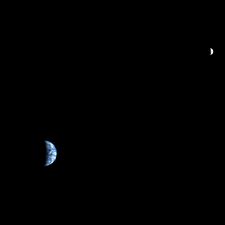
Due to the axial tilt of the Earth, the amount of sunlight reaching any given point on the surface varies over the course of the year. This causes seasonal change in climate, with summer in the northern hemisphere occurring when the North Pole is pointing toward the Sun, and winter taking place when the pole is pointed away. During the summer, the day lasts longer and the Sun climbs higher in the sky. In winter, the climate becomes generally cooler and the days shorter. Above the Arctic Circle, an extreme case is reached where there is no daylight at all for part of the year—a polar night. In the southern hemisphere the situation is exactly reversed, with the South Pole oriented opposite the direction of the North Pole.
By astronomical convention, the four seasons are determined by the solstices—the point in the orbit of maximum axial tilt toward or away from the Sun—and the equinoxes, when the direction of the tilt and the direction to the Sun are perpendicular. In the northern hemisphere, Winter Solstice occurs on about December 21, Summer Solstice is near June 21, Spring Equinox is around March 20 and Autumnal Equinox is about September 23. In the Southern hemisphere, the situation is reversed, with the Summer and Winter Solstices exchanged and the Spring and Autumnal Equinox dates switched.
The angle of the Earth's tilt is relatively stable over long periods of time. The tilt does undergo nutation; a slight, irregular motion with a main period of 18.6 years. The orientation (rather than the angle) of the Earth's axis also changes over time, precessing around in a complete circle over each 25,800 year cycle; this precession is the reason for the difference between a sidereal year and a tropical year. Both of these motions are caused by the varying attraction of the Sun and Moon on the Earth's equatorial bulge. From the perspective of the Earth, the poles also migrate a few meters across the surface. This polar motion has multiple, cyclical components, which collectively are termed quasiperiodic motion. In addition to an annual component to this motion, there is a 14-month cycle called the Chandler wobble. The rotational velocity of the Earth also varies in a phenomenon known as length of day variation.
In modern times, Earth's perihelion occurs around January 3, and the aphelion around July 4. These dates change over time due to precession and other orbital factors, which follow cyclical patterns known as Milankovitch cycles. The changing Earth–Sun distance causes an increase of about 6.9% in solar energy reaching the Earth at perihelion relative to aphelion. Since the southern hemisphere is tilted toward the Sun at about the same time that the Earth reaches the closest approach to the Sun, the southern hemisphere receives slightly more energy from the Sun than does the northern over the course of a year. This effect is much less significant than the total energy change due to the axial tilt, and most of the excess energy is absorbed by the higher proportion of water in the southern hemisphere.
Moon
| Diameter | 3,474.8 km |
| Mass | 7.349×1022 kg |
| Semi-major axis | 384,400 km |
| Orbital period | 27 d 7 h 43.7 m |
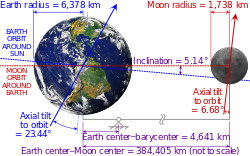
The Moon is a relatively large, terrestrial, planet-like satellite, with a diameter about one-quarter of the Earth's. It is the largest moon in the Solar System relative to the size of its planet, although Charon is larger relative to the dwarf planet Pluto. The natural satellites orbiting other planets are called "moons" after Earth's Moon.
The gravitational attraction between the Earth and Moon causes tides on Earth. The same effect on the Moon has led to its tidal locking: its rotation period is the same as the time it takes to orbit the Earth. As a result, it always presents the same face to the planet. As the Moon orbits Earth, different parts of its face are illuminated by the Sun, leading to the lunar phases; the dark part of the face is separated from the light part by the solar terminator.
Due to their tidal interaction, the Moon recedes from Earth at the rate of approximately 38 mm a year. Over millions of years, these tiny modifications—and the lengthening of Earth's day by about 23 µs a year—add up to significant changes. During the Devonian period, for example, (approximately 410 mya) there were 400 days in a year, with each day lasting 21.8 hours.
The Moon may have dramatically affected the development of life by moderating the planet's climate. Paleontological evidence and computer simulations show that Earth's axial tilt is stabilized by tidal interactions with the Moon. Some theorists believe that without this stabilization against the torques applied by the Sun and planets to the Earth's equatorial bulge, the rotational axis might be chaotically unstable, exhibiting chaotic changes over millions of years, as appears to be the case for Mars.
Viewed from Earth, the Moon is just far enough away to have almost the same apparent-sized disk as the Sun. The angular size (or solid angle) of these two bodies match because, although the Sun's diameter is about 400 times as large as the Moon's, it is also 400 times more distant. This allows total and annular solar eclipses to occur on Earth.
The most widely accepted theory of the Moon's origin, the giant impact theory, states that it formed from the collision of a Mars-size protoplanet called Theia with the early Earth. This hypothesis explains (among other things) the Moon's relative lack of iron and volatile elements, and the fact that its composition is nearly identical to that of the Earth's crust.
Asteroids and artificial satellites
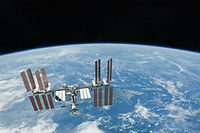
Earth has at least five co-orbital asteroids, including 3753 Cruithne and 2002 AA29.
On July 27, 2011, astronomers reported a trojan asteroid companion, 2010 TK7, librating around the leading Lagrange triangular point, L4, of Earth in Earth's orbit around the Sun.
As of 2011, there are 931 operational, man-made satellites orbiting the Earth. There are also inoperative satellites and over 300,000 pieces of space debris. Earth's largest artificial satellite is the International Space Station.
Habitability
A planet that can sustain life is termed habitable, even if life did not originate there. The Earth provides liquid water—an environment where complex organic molecules can assemble and interact, and sufficient energy to sustain metabolism. The distance of the Earth from the Sun, as well as its orbital eccentricity, rate of rotation, axial tilt, geological history, sustaining atmosphere and protective magnetic field all contribute to the current climatic conditions at the surface.
Biosphere
The planet's life forms are sometimes said to form a "biosphere". This biosphere is generally believed to have begun evolving about 3.5 bya. The biosphere is divided into a number of biomes, inhabited by broadly similar plants and animals. On land, biomes are separated primarily by differences in latitude, height above sea level and humidity. Terrestrial biomes lying within the Arctic or Antarctic Circles, at high altitudes or in extremely arid areas are relatively barren of plant and animal life; species diversity reaches a peak in humid lowlands at equatorial latitudes.
Natural and environmental hazards
Large areas of the Earth's surface are subject to extreme weather such as tropical cyclones, hurricanes, or typhoons that dominate life in those areas. From 1980 to 2000, these events caused an average of 11,800 deaths per year. Many places are subject to earthquakes, landslides, tsunamis, volcanic eruptions, tornadoes, sinkholes, blizzards, floods, droughts, wildfires, and other calamities and disasters.
Many localized areas are subject to human-made pollution of the air and water, acid rain and toxic substances, loss of vegetation ( overgrazing, deforestation, desertification), loss of wildlife, species extinction, soil degradation, soil depletion, erosion, and introduction of invasive species.
According to the United Nations, a scientific consensus exists linking human activities to global warming due to industrial carbon dioxide emissions. This is predicted to produce changes such as the melting of glaciers and ice sheets, more extreme temperature ranges, significant changes in weather and a global rise in average sea levels.
Human geography
Cartography, the study and practice of map making, and vicariously geography, have historically been the disciplines devoted to depicting the Earth. Surveying, the determination of locations and distances, and to a lesser extent navigation, the determination of position and direction, have developed alongside cartography and geography, providing and suitably quantifying the requisite information.
Earth has reached approximately 7,000,000,000 human inhabitants as of October 31, 2011. Projections indicate that the world's human population will reach 9.2 billion in 2050. Most of the growth is expected to take place in developing nations. Human population density varies widely around the world, but a majority live in Asia. By 2020, 60% of the world's population is expected to be living in urban, rather than rural, areas.
It is estimated that only one-eighth of the surface of the Earth is suitable for humans to live on—three-quarters is covered by oceans, and half of the land area is either desert (14%), high mountains (27%), or other less suitable terrain. The northernmost permanent settlement in the world is Alert, on Ellesmere Island in Nunavut, Canada. (82°28′N) The southernmost is the Amundsen-Scott South Pole Station, in Antarctica, almost exactly at the South Pole. (90°S)
Independent sovereign nations claim the planet's entire land surface, except for some parts of Antarctica and the odd unclaimed area of Bir Tawil between Egypt and Sudan. As of 2013 there are 206 sovereign states, including the 193 United Nations member states. In addition, there are 59 dependent territories, and a number of autonomous areas, territories under dispute and other entities. Historically, Earth has never had a sovereign government with authority over the entire globe, although a number of nation-states have striven for world domination and failed.
The United Nations is a worldwide intergovernmental organization that was created with the goal of intervening in the disputes between nations, thereby avoiding armed conflict. The U.N. serves primarily as a forum for international diplomacy and international law. When the consensus of the membership permits, it provides a mechanism for armed intervention.
The first human to orbit the Earth was Yuri Gagarin on April 12, 1961. In total, about 487 people have visited outer space and reached Earth orbit as of July 30, 2010, and, of these, twelve have walked on the Moon. Normally the only humans in space are those on the International Space Station. The station's crew, currently six people, is usually replaced every six months. The furthest humans have travelled from Earth is 400,171 km, achieved during the 1970 Apollo 13 mission.
Cultural and historical viewpoint
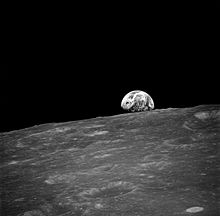
The standard astronomical symbol of the Earth consists of a cross circumscribed by a circle.
Unlike the rest of the planets in the Solar System, humankind did not begin to view the Earth as a moving object in orbit around the Sun until the 16th century. Earth has often been personified as a deity, in particular a goddess. In many cultures a mother goddess is also portrayed as a fertility deity. Creation myths in many religions recall a story involving the creation of the Earth by a supernatural deity or deities. A variety of religious groups, often associated with fundamentalist branches of Protestantism or Islam, assert that their interpretations of these creation myths in sacred texts are literal truth and should be considered alongside or replace conventional scientific accounts of the formation of the Earth and the origin and development of life. Such assertions are opposed by the scientific community and by other religious groups. A prominent example is the creation-evolution controversy.
In the past there were varying levels of belief in a flat Earth, but this was displaced by spherical Earth, a concept that has been credited to Pythagoras (6th century BC). The human perspective regarding the Earth has changed following the advent of spaceflight, and the biosphere is now widely viewed from a globally integrated perspective. This is reflected in a growing environmental movement that is concerned about humankind's effects on the planet.
